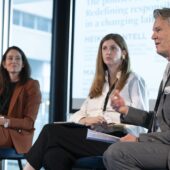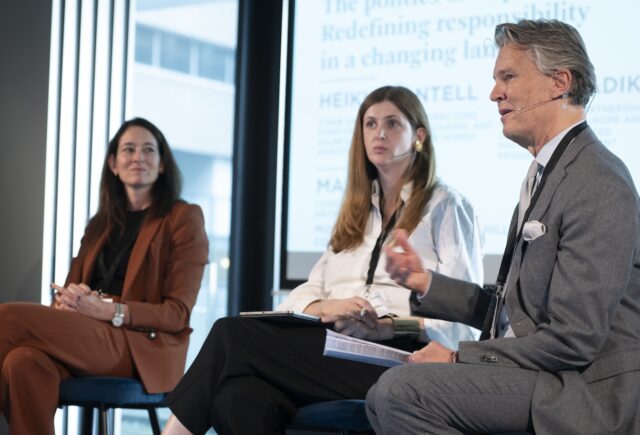In this enlightening book, our reviewer learns what “Murder, She Wrote” – the iconic 1980s detective TV series starring Angela Lansbury – can teach us about impact assessment.

In Brief
- ‘Creating Meaningful Impact: The Essential Guide to Developing an Impact-Literate Mindset’ was written by impact expert Julie Bayley.
- Bayley, a founder of the Lincoln Impact Literacy Institute, explores impact from within the research sector.
- Among her golden nuggets of advice are “start chasing meaning not unicorns” and “own your expertise, but don’t be a jerk”.
Dr Julie Bayley is an international expert on research impact and is currently the director of research impact development at the University of Lincoln (UK), and the founder and director of the Lincoln Impact Literacy Institute.
More importantly, she writes superbly well, in an irreverent, fun way that hooks the reader and wins them over.
“If you’re looking for unequivocal, data enforced arguments about which logic model is better, then you’ll be a teensy bit (very) disappointed. I’ll very unprofessionally use a lot of analogies and references to film, TV and other random things.” The book’s “tone is, well, me – the same as if you were listening to me rattle on at a conference or in a workshop. Apologies, you may need wine.”
I adored this book and will give it to every young academic on my Christmas present list.
Struggling UK academics
Those poor things have been given a starry role in impact whether they like it or not. Since 1986, cyclical assessments of the quality of UK research have underpinned the allocation of ‘quality research (QR) income’ to universities. In 2014, impact was newly introduced to form 20% of the assessment weighting, increased to a 25% weighting from 2021 onwards.
The pressure is on for academics to prove their research has impact. As Bayley says, this “can feel exhausting, because research can be exhausting, and because academia can be exhausting. If you add commuting, kids, health issues, caring responsibilities, job precarity, pandemics and all else into the mix, there’s a less than healthy correlation between life and the need for a cash-and-carry sized bar of Dairy Milk” [chocolate].
The effects are not always good, as she explains. “Even the best-laid plans can fall foul to the negative mood created by having no biscuits at a meeting.” Academia has ended up with “an army of people working not fully on impact, but on devising time-and institution-bound rule-compliant accounts of world-changing effect.” And further: “It’s easy for us to sometimes forget – with academia being such a pressure cooker of introspection – that the things we count within the university walls often don’t count outside.”
This book, packed with good advice, combats that danger.
Achieving impact literacy
Bayley’s goal is for academics to achieve impact literacy, which she defines as “the ability to understand, appraise and make decisions about how to connect your research to the outside work. It reflects the understanding necessary to align the ‘moveable parts’ of impact to develop and execute meaningful, appropriate and realistic pathways to generate benefit in the ‘real world’.”
She implores academics to ask themselves a series of tough questions. Have you: “Prioritised what can be documented over what should be changed? Prioritised what sounds impressive over what makes a difference? Decided against an impact opportunity because it isn’t ‘worth’ enough”.
If so, you should start “chasing meaning not unicorns” and “reset your thinking using this elaborate ten-point strategy for establishing meaning: 1. Ask people 2. Ask people 3. Ask people 4. Ask people 5. Ask people 6. Ask people 7. Ask people 8. Ask people 9. Ask people 10. Ask people.”
Jessica Fletcher
When it comes to impact assessment, she admits to ‘shoehorning in’ a “Murder, She Wrote” reference, imploring academics to “think what would Jessica Fletcher do?” (the fictional sleuth in the popular American TV show).
“Corroborating impact is an exercise in piecing together the evidence that legitimately and reasonably pushes claims beyond doubt. We might have the luxury of hard, irrefutable, smoking-gun evidence or we might need to assemble various softer clues which only when pieced together tell the story. And just like a detective show, when all else fails, sometimes all we can do is fall back on pure logic to eliminate any alternative explanations.”
She also exhorts her reader to “own your expertise, but don’t be a jerk”, because “the pressures to ‘do’ impact can unintentionally (or intentionally, depending on your personal life choices) open the door to arrogance”.
Not for the straightlaced
This irreverent style will not appeal to everyone, but it certainly did to me. After all, in Professor Derek Stewart’s words, quoted by Bayley: “What we have to remember about the discovery of penicillin is that it happened because Fleming was a naughty boy and left the cultures out on the table when he went away for a few days”.
As the author intended, I found my “impact mojo” in this book, because as she concludes: “Impact matters because the world matters. And that’ll do me. Good luck x”.





